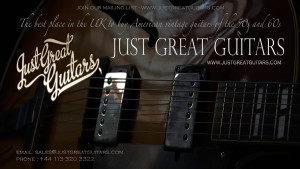 We have an illuminating interview this week with Russ (the founder and owner of Just Great Guitars) conducted by writer Huw Price. It offers a great overview of how Russ has developed JGG and why his love for vintage guitars continues to drive him today. Here’s the first part of the interview and we’ll post the second for you next week. Enjoy!
We have an illuminating interview this week with Russ (the founder and owner of Just Great Guitars) conducted by writer Huw Price. It offers a great overview of how Russ has developed JGG and why his love for vintage guitars continues to drive him today. Here’s the first part of the interview and we’ll post the second for you next week. Enjoy!
After renewing his love of guitars with a cheap Chinese acoustic, Russ Lewis began collecting vintage guitars and gradually developed into an online dealer. Huw Price takes the tour.
So how did Russ get into vintage guitars?
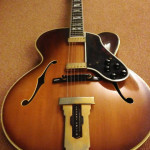 ‘Like a lot of other guys I worked, I built my career, I had my family, then I remembered that the thing sitting in the corner, that had become merely decorative, used to play a much bigger part in my life…we were living in central London at the time and I had a big old Eko acoustic with a neck that felt like it was made of railroad sleepers. I hated playing it, but since we were spending most evenings at home with the kids, I decided it was time to get back to playing guitar, so I went down to Denmark Street and bought myself a Chinese-made guitar. It wasn’t great like the Martin I tried at the time, but it was enough to get me back into playing’.
‘Like a lot of other guys I worked, I built my career, I had my family, then I remembered that the thing sitting in the corner, that had become merely decorative, used to play a much bigger part in my life…we were living in central London at the time and I had a big old Eko acoustic with a neck that felt like it was made of railroad sleepers. I hated playing it, but since we were spending most evenings at home with the kids, I decided it was time to get back to playing guitar, so I went down to Denmark Street and bought myself a Chinese-made guitar. It wasn’t great like the Martin I tried at the time, but it was enough to get me back into playing’.
‘I have a theory that most people who end up buying and selling, or even repairing guitars, do so out of a frustrated sense of not being the guitarist they wanted to be. I’m definitely like that, so I just started dealing in them through my website, www.justgreatguitars.com My dad is an antiques dealer so the whole concept of having old things around the house was quite normal to me’.
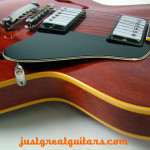 ‘I took some of the pension fund money and put a little bit into vintage guitars that I personally liked and that I’d be happy to live with for ten years. That’s my main criteria, and I only buy guitars that I think sound good. I mainly buy in America and when I bring them back I take my time getting them clean and properly set up. Rarely will I do any major work, for instance I’ll never refret a guitar but I’ll always tell customers if I think it might benefit from one’.
‘I took some of the pension fund money and put a little bit into vintage guitars that I personally liked and that I’d be happy to live with for ten years. That’s my main criteria, and I only buy guitars that I think sound good. I mainly buy in America and when I bring them back I take my time getting them clean and properly set up. Rarely will I do any major work, for instance I’ll never refret a guitar but I’ll always tell customers if I think it might benefit from one’.
‘When I put them up for sale on my website I really enjoy trying to describe the emotional experience of playing a particular guitar. So I was initially doing this as an investment, but the dealing had to pay for the investment. After all it’s quite expensive to go to America and travel around. I certainly don’t make enough to give up my day job. I like to think of it as my out of control hobby.’
Having the opportunity to play so many classic models, Russ has now settled on some favourites.
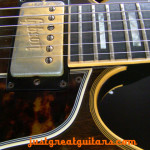 ‘My main guitar is a 1965 sunburst Gibson ES-330. From the very first time that I saw a 330 I just loved that model. It’s not as heavy as an ES335, so it doesn’t kill your shoulder on gigs and I’ve always been drawn to the single coil P90 sound rather than humbuckers. I understand that the P90 is the cheaper pickup but it’s the same with acoustic guitars because I prefer mahogany to rosewood. I know a Martin D28 is supposedly superior to a D18, but I prefer that woodiness. I always keep a few ES-330s in stock and I just bought a cherry red ’61 ES330 with a dot neck and the Mickey Mouse ears. It’s got a really wide and flat neck profile, but I’d like it even more if it had a Bigsby. I know they’re not popular on Gibsons, but I do like them’.
‘My main guitar is a 1965 sunburst Gibson ES-330. From the very first time that I saw a 330 I just loved that model. It’s not as heavy as an ES335, so it doesn’t kill your shoulder on gigs and I’ve always been drawn to the single coil P90 sound rather than humbuckers. I understand that the P90 is the cheaper pickup but it’s the same with acoustic guitars because I prefer mahogany to rosewood. I know a Martin D28 is supposedly superior to a D18, but I prefer that woodiness. I always keep a few ES-330s in stock and I just bought a cherry red ’61 ES330 with a dot neck and the Mickey Mouse ears. It’s got a really wide and flat neck profile, but I’d like it even more if it had a Bigsby. I know they’re not popular on Gibsons, but I do like them’.
Which guitars are holding steady or even climbing in value during the current economic climate?
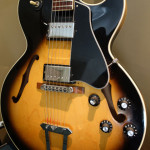 ‘I’ve been lucky because I’ve always avoided the high ticket guitars. I thought they were silly money so any drop in value I’d regard as a positive correction. I’ve noticed that ES-330 prices are going up quite a lot and they’re getting harder to find. After rising quite aggressively, Gibson ES175s seem to be holding and I don’t see them coming down at all. Some of the big dealers are hurting financially and they’re letting inventory go just to release money. One collector that I know in the US was recently selling some mint pieces for half of what he would have got a couple of years ago’.
‘I’ve been lucky because I’ve always avoided the high ticket guitars. I thought they were silly money so any drop in value I’d regard as a positive correction. I’ve noticed that ES-330 prices are going up quite a lot and they’re getting harder to find. After rising quite aggressively, Gibson ES175s seem to be holding and I don’t see them coming down at all. Some of the big dealers are hurting financially and they’re letting inventory go just to release money. One collector that I know in the US was recently selling some mint pieces for half of what he would have got a couple of years ago’.
So with the baby boomers ageing and developing arthritis, will vintage guitars prove to be sound investments in the long term?
‘I would say so, simply because although they’ll make great copies and develop software that can emulate them, they will never make those exact guitars again. Purely for that reason these vintage guitars have intrinsic value. Taking it further, I think the archtops have got more room to go up than anything else. With Fender style guitars there’s nothing of intrinsically high quality and they’re simple to replicate, whereas with some archtops the workmanship and the knowledge of how to work with the materials was quite special’.
‘The difficulty is that it follows fashions, for instance I have a lovely 1940s Epiphone Triumph with a carved spruce top and no cutaway. It really wants to be played as a swing guitar but there aren’t that many people around who can play that style any more. The jazz scene is healthier in Europe and most of the big bodied arch tops I sell go to places like Germany and Belgium. Having said that, the Triumph is today being shipped-off to its new home – in the Shetland Isles!
Part two of the interview next week.

No Comment.
Add Your Comment